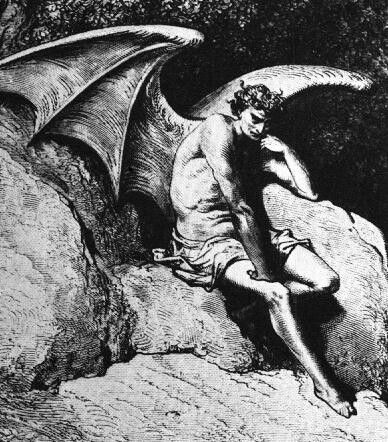I noticed how today, the 20th of May, is a feast for Lucifer in some parts of the Catholic liturgical calendar.
Okay, Lucifer of Cagliari, a fourth century bishop of Cagliari in Sardina. Not much remembered these days outside of Sardina, he left a trail of controversy. His fame at the time was as a ferocious opponent of Arianism. His views were so extreme that even Athanasius who is said to have physically assaulted the priest Arius, thought that Lucifer went too far.
That set me first to wonder if there were any other saint Lucifers. And there are. There’s a martyr priest named Lucifer. And a Lucifera, a woman martyr. And while not remembered as a saint there was a bishop of Siena named Lucifer. It kind of runs out there. But there was a time, and at least a region, where Lucifer was an okay name.
Lucifer is Latin and ultimately means morning star, or bringer of light. The lord of light. The name wasn’t originally identified with a personified evil. For instance the star alluded to in Numbers 24 is interpreted by Christians as alluding to Jesus. And in the Christian scriptures we find Jesus as the light or the star in the 2nd letter of Peter as well as multiple times in the gospel of John.
It would appear the shift for Lucifer came in the fourth century with Jerome’s Latin translation of the Bible and specifically Isaiah 14:12. For more than a thousand years Jerome’s Latin Bible was the Bible of the West. And even as vernacular translations appeared, it was that particular passage that kept Lucifer as a named fallen angel. The sense of which we find in the King James English:
How art thou fallen from heaven,
O Lucifer, son of the morning!
how art thou cut down to the ground,
which didst weaken the nations!
Slowly Lucifer became the devil.
One of the tragedies of the Christian tradition, in my view, is the near Zoroastrian dualism of much of Christianity, where we find ourselves in a near eternal combat between good and evil. I find it even more interesting, rich, and possibly of some use to us on our spiritual paths, trying to make sense of this world and our hearts; to find it can sometimes be hard to tell which lord of light is beckoning us.
I’ve long noticed parts of the Christian community worship a god who hates all the same people they hate. And the hate is a hatred for those who are different. A ruthless divinity without mercy or pity. In those parts this god of hate is called Jesus. A terrible lord of light. And. I think this at my most most judgmental. I notice that, as well. And. I notice how this divinity is a sort of black hole that draws people into some dazzling terrible darkness. Lots of temptation in our hatreds, in our certainties.
I also think about Mara in Buddhism. Among other things Mara is the personification of delusion. Etymologically the name seems to derive from a root meaning killing. It is chaos to Buddhism’s ordering of things. It is the deity of desire, death, and rebirth. However, to keep everything interesting. In the two truths of the Mahayana, this world of delusion, whether personified or not, is also the world of awakening. In the Heart Sutra these two things, let’s say for the sake of illustration, heaven and hell, are one.
So if Jesus and Lucifer might be one, the Buddha and Mara might also be one.
Are.
Although of course its all messy. And the intimate path is one of uncovering, witnessing, and realizing one’s identity with. This isn’t meant to be reductive, to say it’s all the same. That’s missing a couple of points.
Everything, including the path to heaven is heaven. This is found as we surrender into the mystery. But, we can just as easily make it the path to hell, where everything is hell. Letting be and grasping after. Two choices.
Seductions and traps await the unwary. Although one pretty good test is that if the being who presents hates everyone you hate, there’s a passing chance you’re talking with a devil.
In this mysterious world we have few choices. Much of what will become of us has been written. Causes and conditions continue on. And on. And on…
But, there is something in our hands. In an opening of our hearts, in our seeing our identity in each other, we find ourselves transforming. Love in its various applications appears to be the secret. Opening one’s heart.
One promise on the way.
Love never fails. Whether there be prophecies, they shall fail; whether there be tongues, they shall cease; whether there be knowledge, it shall vanish away. For we know in part, and we prophesy in part. But when that which is perfect is come, then that which is in part shall be done away. When I was a child, I spake as a child, I understood as a child, I thought as a child: but when I became an adult, I put away childish things. For now we see through a glass, darkly; but then face to face: now I know in part; but then shall I know even as also I am known. And now abides faith, hope, love, these three; but the greatest of these is love.
Here the devil brings water to the thirsty. A small thing. A noticing thing. A doing thing. A yes or no thing.
And love is another of those tricky words. It can mean grasping. But here and in Paul’s hymn it is something rather different.
Letting the bottom fall out of the bucket. Then miracles abound. Lucifer does become Christ. And Mara is the Buddha.
Not a mere dualism, but a transformation that brings everything along together.
This is we discover in the midst of that dazzling darkness, the light of the world.














